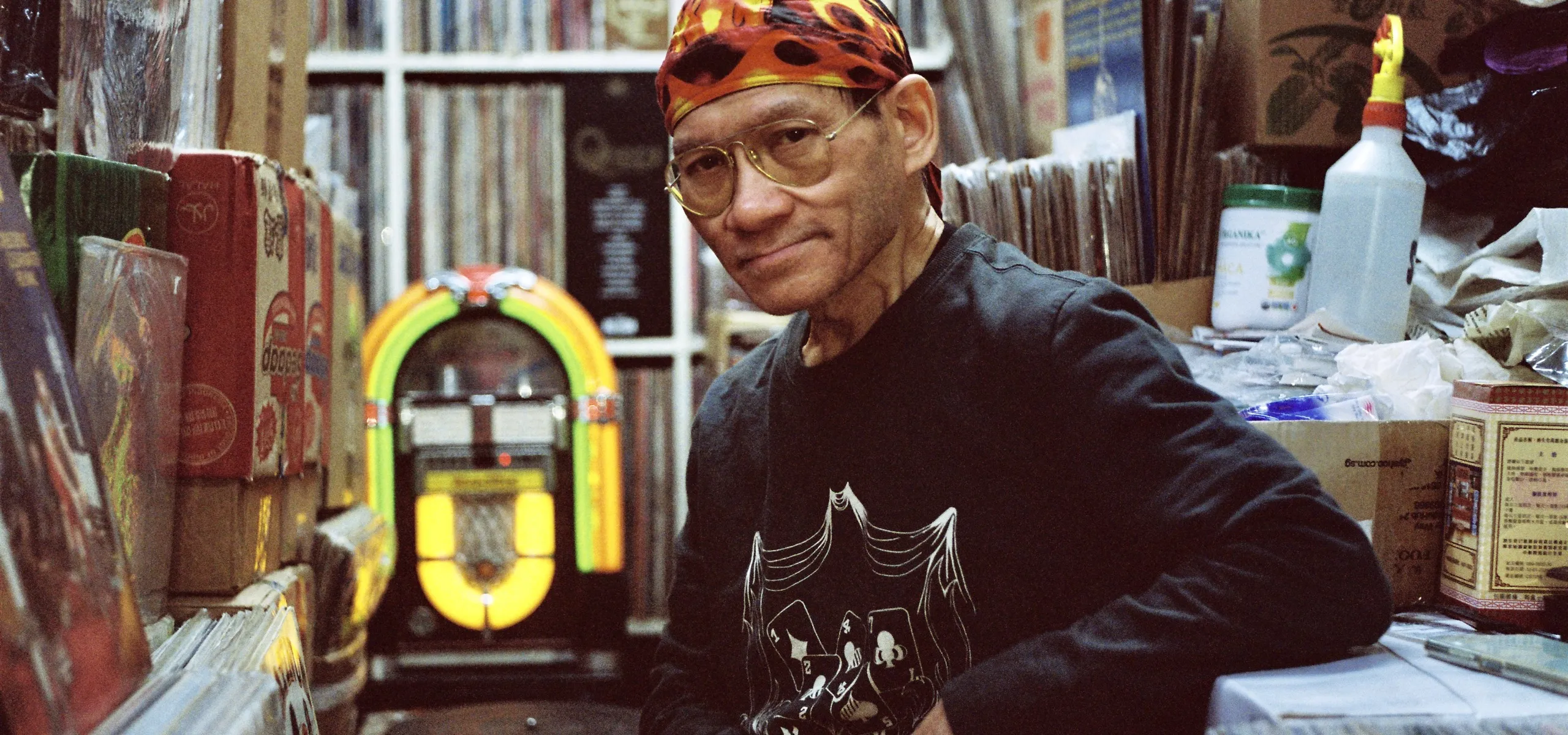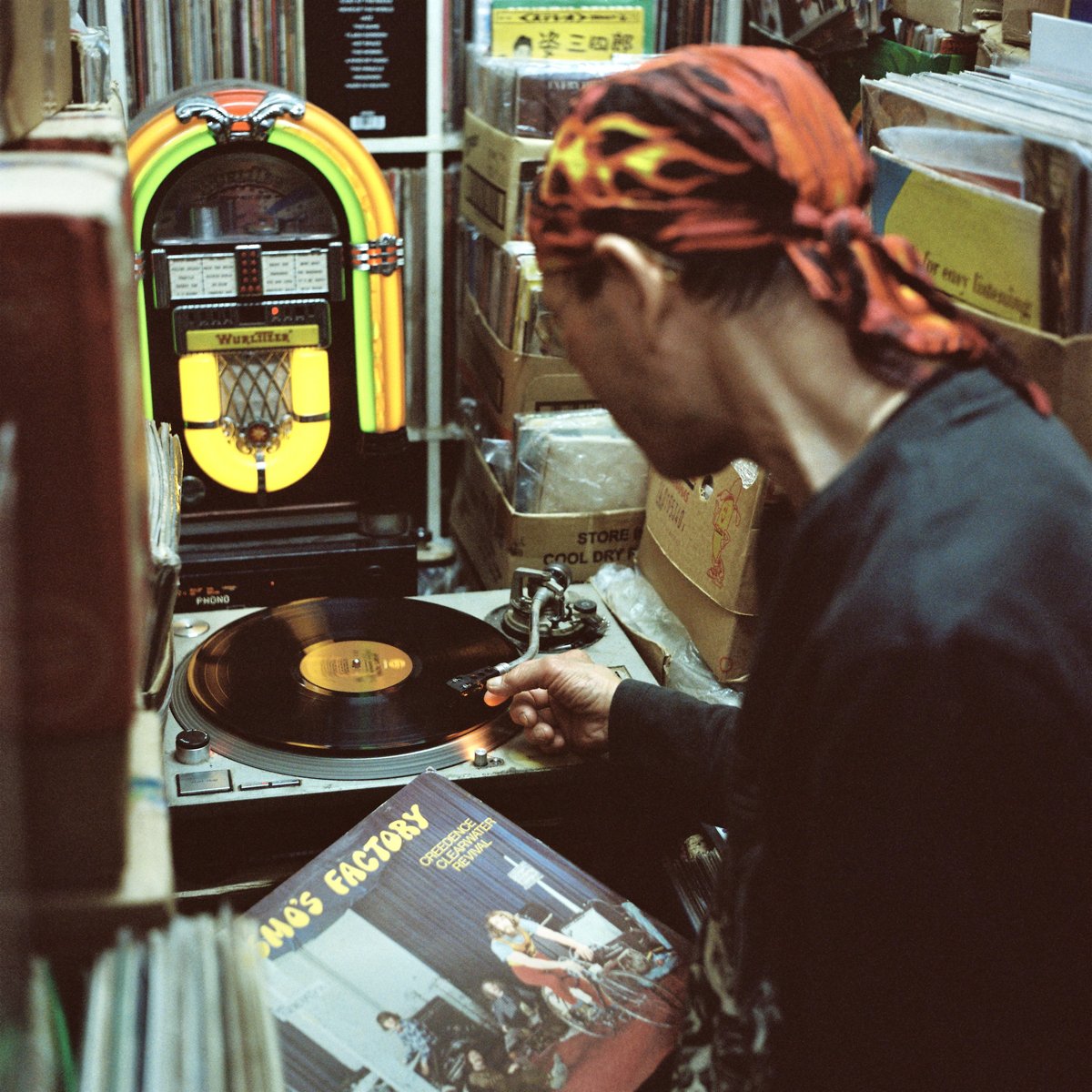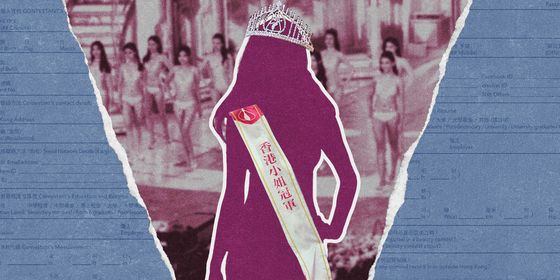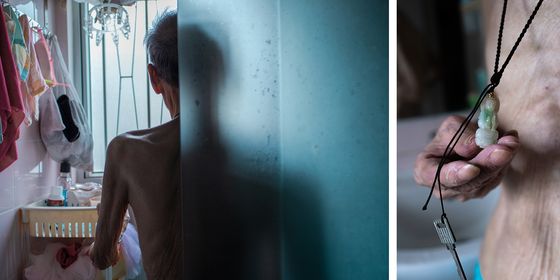Record store owner Paul Au has escaped the Vietnam War, slept in the streets, and weathered two pandemics to pursue his passion for vinyl
It’s easy to get distracted, or even lost, in the famous maze-like street markets in Sham Shui Po. Hundreds of sellers in green sheet-metal stalls offer everything from DVD players to tools, toys, clothes, and other kitsch both used and new. The spirit of entrepreneurial resolve is in the air, as is the smell of cheap afternoon snacks in Hong Kong: instant noodles with fried spam, buttery toast, and sweet milk tea served in little shops behind the market stalls to hungry locals from all walks of life.
Right here in the heart of Kowloon, a refugee from the Vietnam War has spent the last four decades beating all odds in pursuit of freedom and his one lifelong passion—vinyl records.
To find Au Tak Shing, better known as Paul Au, and his record store Vinyl Hero, one has to know the way. An elevator climbs to the fifth floor of a residential building on Cheung Sha Wan Road. Paul’s apartment can be easily identified by the many stickers and doodles left on the door by previous patrons and friends. Behind it, a windowless room of around 25 square meters lit by incandescent bulbs is where Paul, a gaunt-looking man in his 60s, has been living and working for the last 20 years. It can rightfully be described as a fortress, with towers not made of stone but of memories, love, and stacks upon stacks of old vinyl records: Japanese city pop, Cantonese chansons, classic rock, obscure 2000s drum and bass—Paul has it all, stacked ceiling-high with barely any room to move in between.
Paul knows his way around his “fortress,” deftly moving through the tiny paths between the stacks, and sometimes climbing behind them to fetch something hidden from view. He is not alone today, as a customer in her 20s is shopping for old Chinese folk songs. Paul hands her a record from the 1930s. “You are an old soul, you have a young body but you are an old soul—like myself, I’m stuck in the past,” he tells her with a smile.
Many of the records jam-packed into his Sham Shui Po apartment are directly connected to that eventful past, like Cosmo’s Factory (1970) by US rock band Creedence Clearwater Revival, one of the first records Paul ever bought as a teenager in Vietnam before fleeing to Hong Kong. The son of Chinese migrants from Guangdong province, Paul was born in Saigon (now Ho Chi Minh City) in 1957 and still has a vivid recollection of his childhood under the US occupation in the 1960s and early ’70s. “It was like little America inside Vietnam,” he recalls of the city, where he was first exposed to Western music.
Paul started listening to American Forces Vietnam Network (AFVN), a radio network catering to GIs stationed in Vietnam. Intrigued by music from The Beach Boys, Motown, and the like, he began buying his first records with saved up pocket money. “We went to the street market in Saigon and the Vietnamese were selling left-behind records from American soldiers for a lot of money,” Paul says. He often goes off on tangents as he describes his childhood, relishing in memories like the time when four US military police officers paid off Vietnamese “cyclo” drivers to borrow their tricycle rickshaws and race each other in the streets of Saigon’s Chinatown.
By 1975, Paul was about to turn 18, putting him at risk of being drafted into the Vietnamese military to be sent off to war. Through contacts in China, his parents arranged for him to be smuggled out of Vietnam in February 1975. He still recalls many details about his weeks-long journey from the rural outskirts of Saigon to Hong Kong—how sampans first took him and many other refugees from Vung Tau on the coast near Saigon to bigger fishing junks; how the smell in the engine room made him and others throw up as they were being taken into deeper waters to board a Taiwanese cargo ship; how they finally arrived in international waters near Hong Kong and disembarked in early February 1975.
I can see clearly now, the rain is gone. I can see all obstacles in my way. The warm voice of Johnny Nash fills the apartment, bringing a smile to Paul’s face as he cues the record for a customer from Finland. The record player is the focal point of Paul’s apartment, like an altar right at the center of his vinyl fortress. The turntable has been used so many times the classic “Technics” logo on the handrest is barely visible anymore.
“Don’t worry, I’ll give you a good price,” Paul tells the customer. “This record is very valuable because it is a Hong Kong pressing with a misprint, see?” He points at the label with the artist’s name misspelled as “Jonny Nash.” Surprised by this specific piece of trivia about a record he just saw Paul pull out from thousands of others, the customer buys it for a few hundred Hong Kong dollars and leaves. “It’s like the faces of your children,” Paul says, pointing at the endless stacks of records. “Even if you don’t see them for a long time, you will remember them.”
Business hasn’t always been so smooth. After his arrival in Hong Kong, Paul spent the first few years doing odd jobs as an unregistered immigrant, including working in a store that sold musical instruments. He was squatting in a rooftop sheet-metal shack in North Point, spending the little money he had on bootleg tapes to listen to music because he owned no record player. He was forced to relocate to a new shack in Sham Shui Po just four blocks from his current place around the end of 1982.
The street markets in the area offered an endless supply of used records, and Paul began picking up whatever he could find to resell on the street. “At that time it was like a paradise for me,” he says. “Whatever I could get my hands on was mine.” He would carry the heavy crates of records from his rooftop down to street level to sell, and then carry it all back up in the evening. As his collection grew too cumbersome to carry, he began keeping his records in one of the back alleys—on metal trolleys off the ground and covered with canvas to protect them from the rain—and often slept there to guard his collection from thieves. “I was like a cowboy who had to watch over his cattle,” he says about that time in Paul’s Records, a 2015 book about his story and Hong Kong music culture written by Andrew S. Guthrie.
By 1992, Paul had set up shop next to a dentist just down the street from his current place, but his neighbor took issue with his street hawking and allegedly convinced the landlord to terminate the lease in 2003. By that time vinyl sales had already declined sharply, but rent in the area began to drop, so Paul was able to move into his current fifth-floor apartment where he has lived and worked ever since. The records in this apartment are but a fraction of his whole collection, comprising tens of thousands of records stored in a warehouse in Tuen Mun that Paul bought in 2001 by selling his motorbike.
Paul recalls that the most difficult times were from around the mid-’90s to 2010, when CD sales dominated the market. The months following the outbreak of the SARS pandemic in 2003 were also challenging. Paul spent the majority of his money on rent and only a fraction on food, and only earned enough to cover his living expenses. Then, as record sales finally began to pick up in the last decade, the Covid-19 pandemic brought harsh containment measures that reduced his business activity by 80 percent. “Luckily I didn’t have to close. I know lots of businesses out there that had to close,” he tells TWOC, pointing in the direction of Sham Shui Po.
His dedication, perhaps paired with his modest lifestyle throughout the years, has helped Paul beat the odds until now. Business seems to be finally turning in his favor these days, with a renewed interest in vinyl records and other retro cultures like film photography—not just among nostalgic boomers, but also a younger generation of people who grew up without vinyl and now regularly visit Paul to delve into the world of analog sound.
At 66 years old, Paul is now renowned and revered as Sham Shui Po’s “Vinyl Hero” not just among locals, but many vinyl lovers from around the world who make a pilgrimage to his fifth-floor vinyl fortress. “I’ve known Paul for 10 years,” says one local “old soul” in his 30s who has arrived in the store. He says he isn’t looking for anything specific today. “I’m just here to be around him.”
Paul pulls out Cosmo’s Factory and puts on “Who’ll Stop the Rain.” The song’s acoustic guitar riff fills the room, and Paul starts singing along to John Fogerty’s famous lyrics imbued with a sense of hardship. Long as I remember the rain been comin’ down...He has weathered the latest storm, it seems, and the clouds are clearing once again over Paul’s vinyl fortress in Sham Shui Po, at least for now.
Photography by Roman Kierst
For the Record: How a War Refugee Built His Vinyl Haven in Hong Kong is a story from our issue, “Kinder Cities.” To read the entire issue, become a subscriber and receive the full magazine.
















